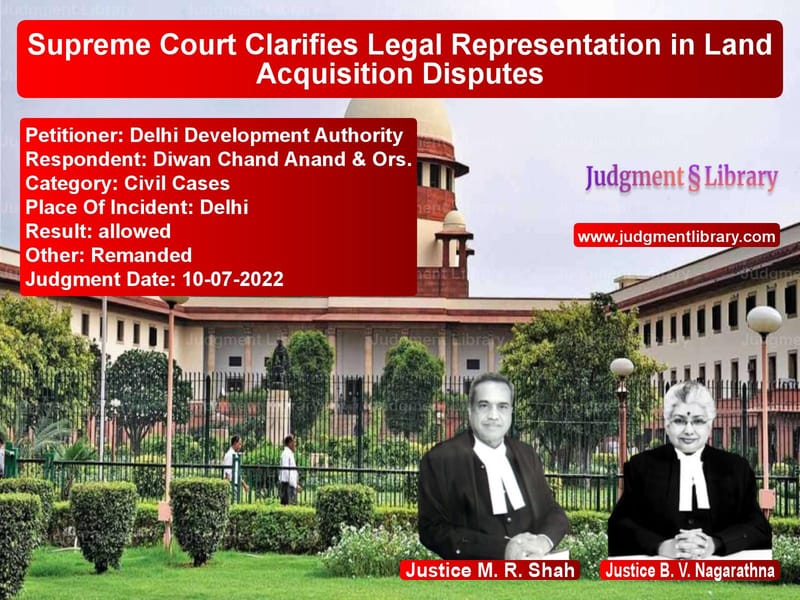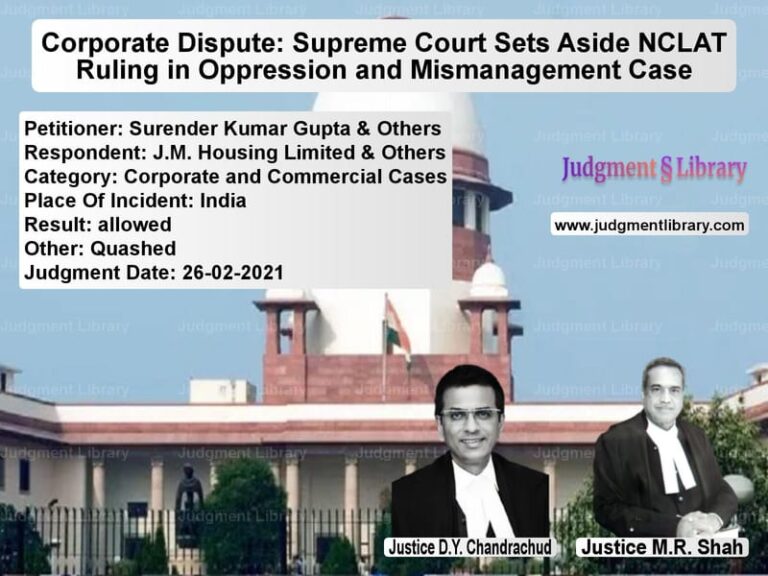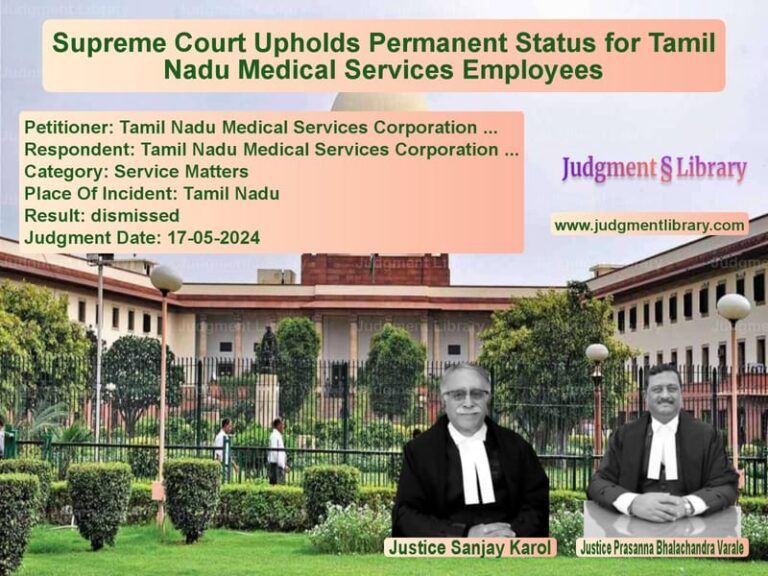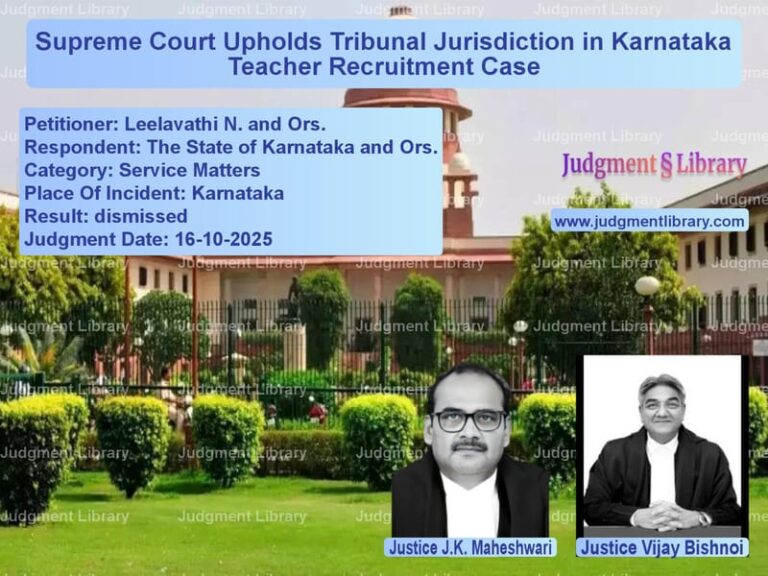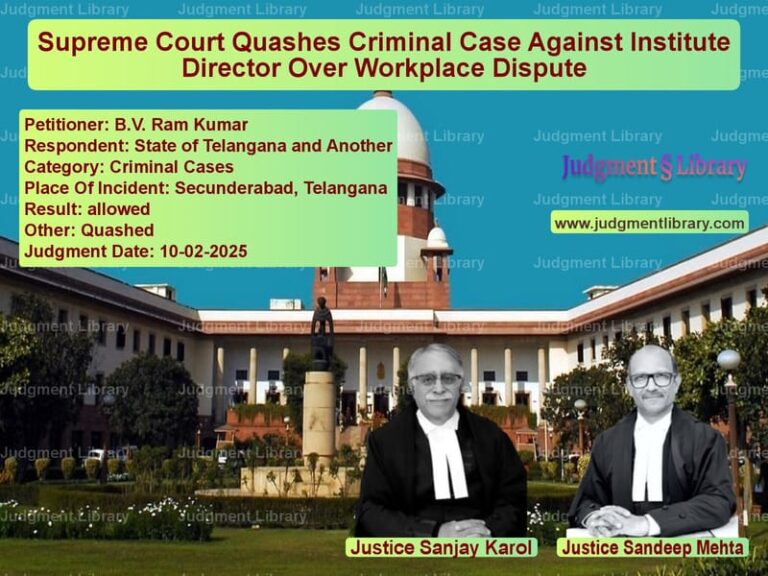Supreme Court Clarifies Legal Representation in Land Acquisition Disputes
The Supreme Court recently delivered a landmark judgment in the case of Delhi Development Authority vs. Diwan Chand Anand & Ors., addressing the issue of abatement of appeals due to the non-substitution of legal representatives of deceased respondents. The ruling provides crucial clarity on how courts should approach land acquisition disputes, particularly in cases where multiple co-owners are involved and some of them pass away during the litigation process.
Background of the Case
The dispute in this case arose from land acquisition proceedings initiated under the Land Acquisition Act, 1894. The land in question was situated in Village Kharera, Delhi, and was acquired by the Delhi Development Authority (DDA) for public development projects.
The original plaintiffs, Diwan Chand Anand and Smt. Chanan Kanta Anand, along with other co-owners, challenged the acquisition process. They argued that the notifications issued under Sections 4 and 6 of the Land Acquisition Act had lost their validity before the suit was even filed. The trial court ruled in their favor, declaring that the acquisition process was legally unsustainable.
High Court Proceedings
Following the trial court’s decision, the DDA appealed to the Delhi High Court. However, the High Court dismissed the appeal on procedural grounds, stating that the appeal had abated due to the death of some of the respondents. The court ruled that since no application was filed to substitute their legal representatives, the appeal could not proceed.
This decision raised significant legal questions regarding the survival of appeals when one or more co-owners pass away and whether remaining legal heirs can adequately represent the interests of the deceased parties.
Key Issues Before the Supreme Court
The Supreme Court was tasked with determining:
- Whether the appeal against the trial court’s decision could continue despite the non-substitution of some deceased respondents.
- Whether the remaining co-owners could adequately represent the interests of the deceased parties.
- The extent to which procedural rules regarding substitution should be applied in cases involving joint property ownership.
Arguments by the Petitioner (DDA)
The Delhi Development Authority contended that:
- The High Court erred in dismissing the appeal solely on procedural grounds without considering the merits of the case.
- Co-owners of the property have joint interests, and the remaining co-owners were fully capable of representing the interests of the deceased respondents.
- The failure to substitute the legal representatives should not automatically lead to abatement if the deceased persons’ interests continue to be represented in the litigation.
- The ruling of the trial court had far-reaching implications for urban development projects, making it imperative for the appeal to be heard on its merits.
Arguments by the Respondents (Legal Heirs of Deceased Owners)
The respondents, represented by the legal heirs of the deceased co-owners, argued that:
- The procedural lapse in failing to substitute the deceased respondents was a fatal defect, and the High Court was justified in dismissing the appeal.
- Each co-owner had an independent stake in the litigation, and the death of a party without substitution meant their interests were no longer represented.
- The appeal had already been pending for an extended period, and procedural compliance was necessary to ensure fair proceedings.
- Land acquisition matters impact individual rights significantly, and procedural formalities should not be overlooked.
Supreme Court’s Observations
The Supreme Court, comprising Justices M. R. Shah and B. V. Nagarathna, carefully examined the legal issues surrounding the abatement of appeals. The Court made the following key observations:
- “One co-owner can prosecute a case on behalf of others. If the estate is represented by surviving legal representatives, the entire appeal should not abate.”
- “The High Court erred in mechanically dismissing the appeal without considering whether the remaining parties adequately represented the deceased respondents.”
- “If the decree is joint and indivisible, failure to bring all legal heirs on record may lead to conflicting decisions.”
- “Procedural law should serve the cause of justice rather than defeat substantive rights due to technical lapses.”
Final Judgment
Based on these findings, the Supreme Court ruled:
“The abatement of an appeal due to the non-substitution of legal representatives must be assessed in the context of whether the remaining parties can adequately represent the deceased respondents’ interests. Dismissing an appeal solely on procedural grounds without evaluating substantive rights is not justified.”
The Court set aside the High Court’s order and remanded the case for fresh adjudication, ensuring that the appeal would be heard on its merits.
Key Takeaways from the Judgment
- Procedural Lapses Should Not Defeat Substantive Justice: Courts must assess whether procedural lapses genuinely affect the merits of the case.
- Co-Ownership and Representation: In property disputes, surviving co-owners can represent deceased co-owners if their interests are aligned.
- Appeals Should Be Heard on Merits: High Courts should avoid dismissing appeals solely due to non-substitution if the deceased’s rights continue to be represented.
- Flexibility in Legal Substitution: The judgment clarifies that substitution rules must be interpreted in a manner that furthers justice rather than obstructs it.
Impact of the Judgment
This ruling is expected to have a significant impact on land acquisition cases and other civil disputes involving multiple stakeholders. By emphasizing substantive justice over rigid procedural compliance, the Supreme Court ensures that important legal rights are not lost due to technicalities.
Conclusion
The Supreme Court’s decision in Delhi Development Authority vs. Diwan Chand Anand & Ors. reaffirms the principle that procedural technicalities should not be used to obstruct the administration of justice. The ruling provides much-needed clarity on the issue of abatement in property disputes and ensures that appeals are heard based on their merits rather than being dismissed on technical grounds. This judgment serves as a vital precedent for future cases where procedural lapses may otherwise result in the loss of substantive rights.
Petitioner Name: Delhi Development Authority.Respondent Name: Diwan Chand Anand & Ors..Judgment By: Justice M. R. Shah, Justice B. V. Nagarathna.Place Of Incident: Delhi.Judgment Date: 10-07-2022.
Don’t miss out on the full details! Download the complete judgment in PDF format below and gain valuable insights instantly!
Download Judgment: delhi-development-au-vs-diwan-chand-anand-&-supreme-court-of-india-judgment-dated-10-07-2022.pdf
Directly Download Judgment: Directly download this Judgment
See all petitions in Property Disputes
See all petitions in Landlord-Tenant Disputes
See all petitions in Damages and Compensation
See all petitions in Public Interest Litigation
See all petitions in Other Cases
See all petitions in Judgment by Mukeshkumar Rasikbhai Shah
See all petitions in Judgment by B.V. Nagarathna
See all petitions in allowed
See all petitions in Remanded
See all petitions in supreme court of India judgments July 2022
See all petitions in 2022 judgments
See all posts in Civil Cases Category
See all allowed petitions in Civil Cases Category
See all Dismissed petitions in Civil Cases Category
See all partially allowed petitions in Civil Cases Category

